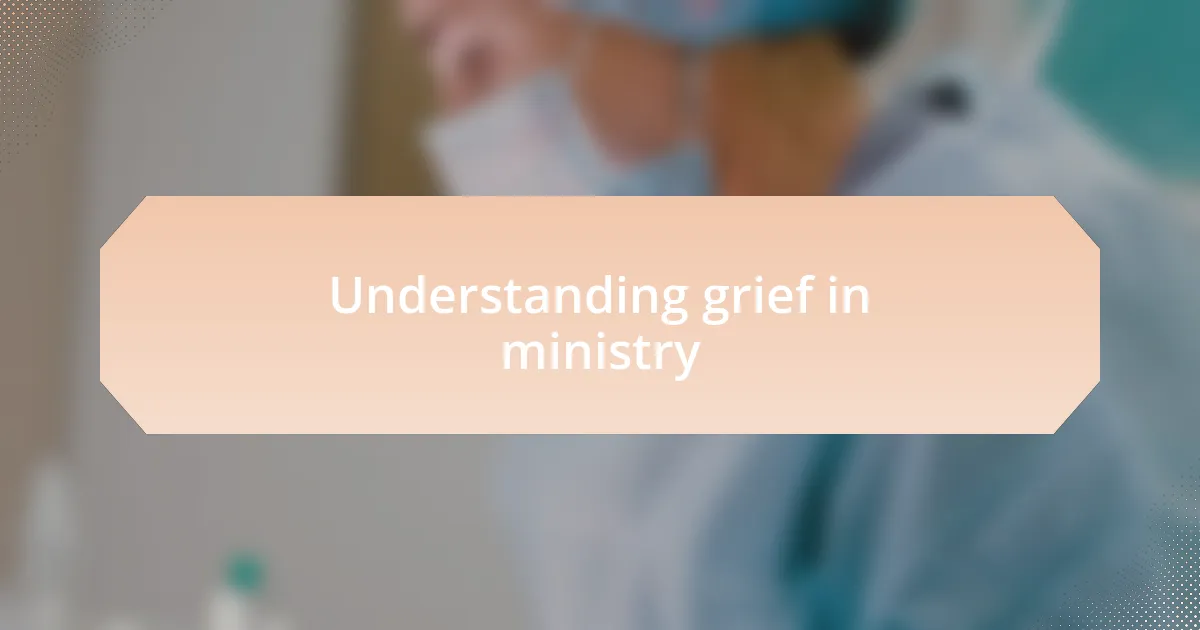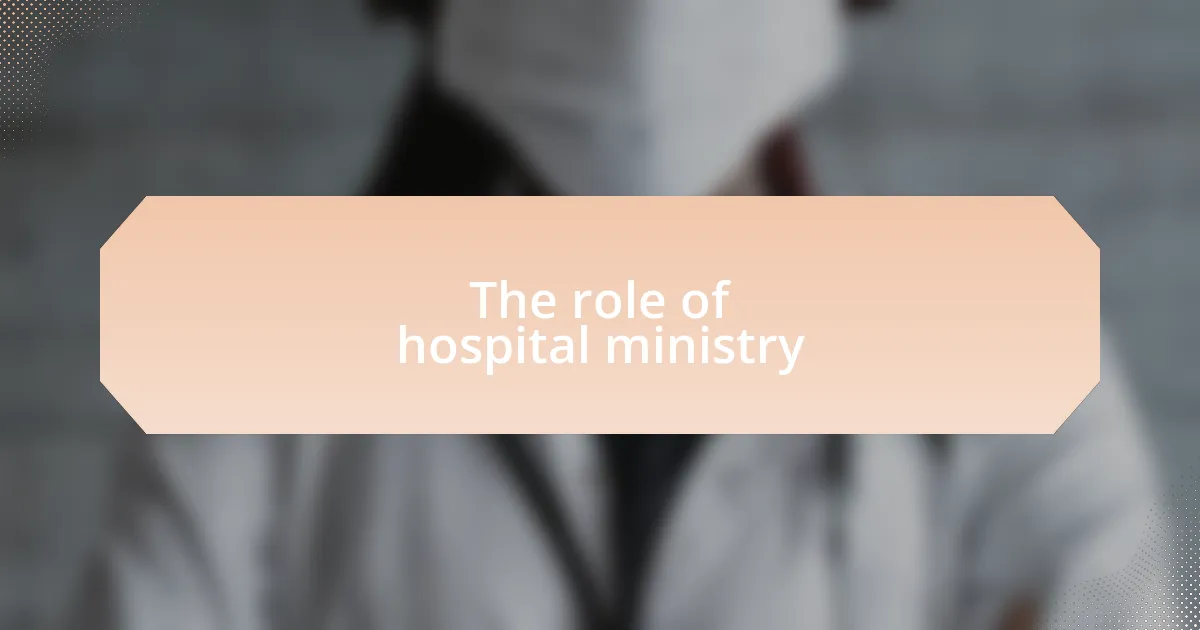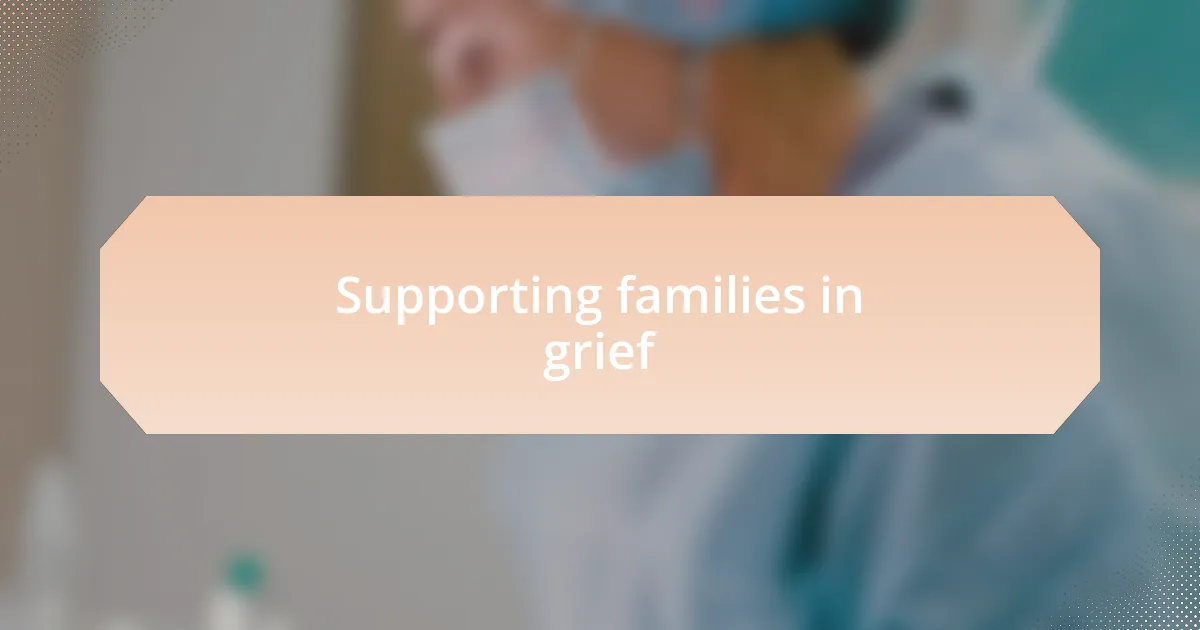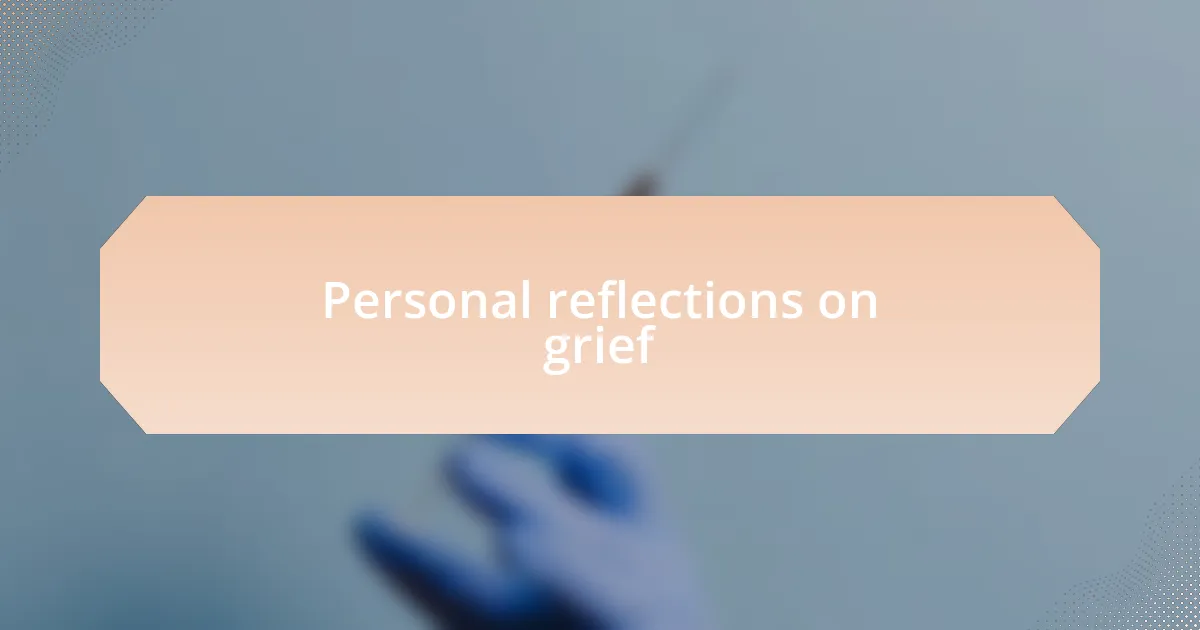Key takeaways:
- Grief in ministry is a shared experience, affecting both the minister and those they serve, requiring empathy and space for personal emotions.
- Hospital ministry provides emotional healing through presence, allowing patients and families to express grief openly, bridging health and spiritual care.
- Supporting grieving families involves practical help, active listening, and follow-up, emphasizing the importance of community and validation of their feelings.
- Effective coping tools for grief include journaling, mindfulness, and participating in supportive groups, highlighting the role of connection and shared experiences in healing.

Understanding grief in ministry
Grief in ministry is an experience that often intertwines with the very fabric of our service. I remember sitting with a family who had just lost their mother; the air was thick with unspoken emotions. In that moment, I realized that grief isn’t just felt by the bereaved; it enveloped me, too. Why is it that our own hearts ache when we share in someone else’s loss?
Navigating grief means understanding that it can manifest in various ways and may not follow a predictable path. For instance, after losing a dear mentor, I found myself oscillating between anger and profound sadness. It made me wonder—how can we, as ministers, create a space for our own grief while supporting others in theirs? This dual experience of feeling both a healer and a grieving person can be incredibly challenging.
As I’ve walked alongside those mourning, I’ve learned that empathy is our greatest tool in ministry. I often ask myself: How can I honor the memories of those we’ve lost while also tending to my own sorrow? It is in the sharing of these stories—the laughter, the tears, the lessons learned—that we truly begin to heal, both for ourselves and for those we serve.

The role of hospital ministry
The role of hospital ministry extends beyond merely providing religious services; it serves as a sanctuary for emotional healing. I vividly recall visiting a patient whose condition was deteriorating. In that room, with the beeping machines and sterile smells, I found the opportunity to offer not just prayers but also a listening ear. In moments like these, I realized the importance of being present, as sometimes, it’s the silence that speaks the loudest.
A significant part of hospital ministry is creating a supportive environment where both patients and their families can express their grief openly. I recently encountered a father who had just learned about his child’s prognosis. In that moment, I felt the weight of his despair. I offered him a comforting presence, encouraging him to share his thoughts and fears. This simple act reminded me how essential it is to validate their feelings, letting them know they are not alone in their anguish.
Additionally, hospital ministry plays a vital role in bridging the gap between health care and emotional care. I often find myself reflecting on how essential it is to advocate for patients’ spiritual needs in the midst of clinical treatments. This aspect can help families navigate their feelings, emphasizing that grief is a shared journey. How can we contribute to a healing process that involves both body and spirit? In essence, ministry in hospitals enriches not just the soul but also the very fabric of the healing experience.

Common experiences of grief
Grief comes with a variety of emotional responses that can take individuals by surprise. I remember sitting with a mother who had just lost her daughter; she cycled through anger, guilt, and profound sadness within just a few minutes. This experience made me realize that people often grapple with feelings that seem contradictory, and these emotional shifts can create a sense of confusion.
Another common experience is the feeling of isolation that often accompanies grief. During my visits, I’ve noticed that many individuals who are grieving feel disconnected from their peers, as if no one can truly understand their pain. It’s heartbreaking to witness, yet it underscores the importance of community support; knowing that someone is there to listen can make a world of difference.
Physical sensations of grief should not be overlooked either. I distinctly remember a man sharing how he felt an ache in his chest, almost as if his heart were breaking. This physical manifestation of grief can be so real that it demands attention. It prompts me to consider, how often do we emphasize the mind-body connection in our conversations about emotional health? Acknowledging these experiences enriches our understanding of grief and enhances our ability to support those in need.

Supporting families in grief
Supporting families in grief requires a compassionate approach, particularly in offering tangible help. I recall a time when a family I was visiting was overwhelmed by the multitude of tasks that come with loss—small errands like grocery shopping or even larger ones like organizing a memorial. By stepping in to assist, I learned that practical support can bring a moment of relief, allowing them to focus on their emotional healing.
Listening is another crucial form of support. I often find that simply being present, without rushing to fill the silence with words, can provide immense comfort. During one visit, I remember sitting quietly with a grieving spouse; their tears flowed, and their stories unfolded. It reinforced my understanding that sharing memories can be a powerful way to honor the loved one lost, something profoundly therapeutic for the bereaved.
Sometimes, it’s easy to overlook the significance of follow-up. After the initial shock of loss wears off, families may still feel a lingering sense of loneliness. I’ve made it a point to reach out weeks or even months later, sending a simple text or making a call just to check in. This small gesture can remind them that they are not forgotten and that their grief is still acknowledged—it often reignites a flicker of hope during a particularly dark time.

Personal reflections on grief
Grief has a way of sneaking up on you, often when you least expect it. I remember a quiet evening when I found myself staring at an empty chair at the dinner table, and suddenly, waves of sorrow crashed over me. It made me realize that grief isn’t just about the initial loss; it’s those quiet moments that can feel impossibly heavy. Have you ever encountered such unexpected reminders? It’s a poignant reminder that grief ebbs and flows, sometimes resurfacing when you’re in a completely different place than when the loss first occurred.
There was a time when I thought grief had a specific timeline, a path I could measure and predict. But through my experiences, it became clear that everyone walks their own journey. I recall a close friend who lost a sibling; I was moved by how their grief was so deeply personal, an intricate web of memories and emotions. This taught me that we can’t rush or redirect someone’s grief. Instead, I’ve learned the importance of patience, allowing feelings to unfold at their own pace, much like the changing seasons.
One profound lesson I’ve taken away is the value of vulnerability in expressing grief. I once attended a group where members were encouraged to share their feelings openly. I held back at first, fearing judgment, but when I finally opened up about my own struggles, the relief was palpable. It struck me that grief can be isolating, yet when we share, we create a bridge of connection, making the burdens just a bit lighter. Have you ever had that experience of vulnerability opening a door to connection? It’s such a powerful reminder that our shared experiences can foster healing and understanding among us all.

Tools for coping with grief
Finding effective ways to cope with grief can be quite personal and often requires experimentation. For me, journaling became a lifeline during my toughest moments. I recall one evening, feeling overwhelmed, I began to write down my thoughts and emotions. Surprisingly, the act of putting pen to paper helped me clarify my feelings, almost as if I was creating a dialogue with myself. Have you ever noticed how articulating your emotions can ease the pressure? It’s a simple tool, yet incredibly profound.
Another tool that I’ve found invaluable is mindfulness. I remember one day, sitting quietly in a park, I focused on the sounds around me—the rustling leaves, the distant laughter of children. By immersing myself in the present, I discovered a sense of peace that allowed me to confront my grief without drowning in it. This practice taught me that while grief may be an uninvited guest, there are moments of beauty and calm that can coexist with the pain. Have you tried mindfulness practices? They can help ground you when emotions start to spin out of control.
Additionally, surrounding myself with supportive individuals has been crucial. I once participated in a grief support group, not fully knowing what to expect. Sharing stories and hearing others’ experiences transformed my understanding of grief. It was comforting to know I wasn’t alone in my feelings. Sometimes, just a simple exchange of “I understand” can provide a tremendous amount of solace. How often do we underestimate the power of community during difficult times? It truly can make all the difference.

Encouraging healing through ministry
One of the most powerful aspects of ministry is its ability to create a sense of belonging during the grieving process. I remember attending a healing service where the warmth of shared prayers wrapped around me like a comforting blanket. It felt like a collective embrace, acknowledging the pain we were each carrying while simultaneously uplifting one another. Have you ever experienced a moment where a shared faith carried you through your darkest hours? That’s the essence of ministry—it fosters connections that can lighten the burden of grief.
Engaging in acts of service within a ministry setting can also be healing. I once volunteered to help plan a memorial event for a loved one, and through that process, I found purpose in the midst of my sorrow. It reminded me that honoring the memory of those we’ve lost can be a beautiful catalyst for our own healing. How can we transform our grief into an opportunity to serve others? Through ministry, we can channel our pain into something meaningful, allowing us to find peace while offering support to those in similar situations.
Moreover, the simple act of listening in a ministry context can be transformative. I recall sitting with a friend who had lost a family member, offering my ears without judgment or interruption. Just being present, allowing them to express their grief, made a profound difference—not just for them but also for me. How often do we underestimate the importance of being a compassionate listener? In ministry, when we take the time to hear someone’s story, we create an atmosphere where healing can truly begin.